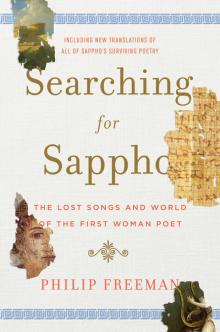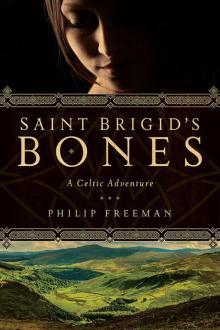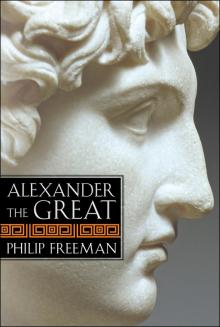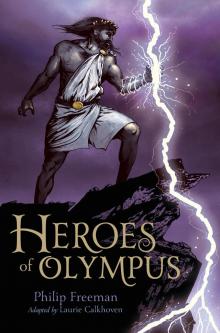- Home
- Philip Freeman
Saint Brigid's Bones Page 7
Saint Brigid's Bones Read online
Page 7
“This is fascinating, Tuán, but you really don’t need to—”
He ignored me as he scooped us each a steaming bowl of stew from the pot over the fire. There was no meat in the stew, but it was a delicious mixture of cream, vegetables, and barley. He also took the bread off the fire and tore the small loaf in half for Dari and me. Tuán continued his story for what seemed like hours, telling us how he had been transformed into a mighty stag, how he had watched waves of new settlers arrive, and how he had become a wild boar, a hawk, and finally a salmon that was eaten by the wife of a local king. He claimed he was then reborn to the queen as a human baby and became a great druid who was converted by Patrick when he first arrived in Ireland. It was useless to interrupt him. Giving the lonely old man a chance to tell his story yet again seemed like a small price to pay for a hot meal and a warm bed.
When he had finished his story, Tuán lay down and fell asleep on his bed with a smile on his face. Dari drained the rest of the mead from her cup and tiptoed quietly towards our bed. One by one, all of Tuán’s animal friends, even the badger, curled up next to him and watched me as I banked the fire and blew out the single candle before crawling under the covers with Dari.
We walked all the next day and reached Sleaty just as it was getting dark. There wasn’t enough light to do any searching that day and the smell of wet, burnt wood from the church was still strong, so we made our camp a little way off in the forest. We made a porridge for supper, then wrapped ourselves in our blankets, thankful that the rain had finally stopped.
I didn’t sleep well that night. I had strange dreams of running through a forest covered in snow trying to find a young girl who kept calling out to me.
When I woke up at dawn, Dari was already heating water over the fire.
“I won’t asked how you slept, since you spent most of the night tossing and turning. What were you dreaming about, or do I want to know?”
I rubbed my eyes and took the cup of broth she offered me.
“It was strange. I was in the woods trying to find a little girl. It was freezing. I wonder what it means?”
“Obviously Brigid wants us to go to the North Pole.”
“Very funny, Dari. I know not every dream means something, but this one was odd.”
“Deirdre, the dream just means you’re frustrated about not finding the bones yet. It also means you kicked off your blanket in the night and were cold. That’s all.”
“Maybe. Let’s finish up here. I want to start searching the ruins of the church.”
We drank our broth, then Dari knelt on the grass. I joined her and sang the morning psalm, then prayed with her for the sisters and brothers back at Kildare and all of those in need. I added a plea to God that he would help us find something that day that would lead us to the bones. When we finished, we walked down to the banks of the Barrow to wash up.
The site of the Sleaty church was much as we had left it. Brother Fiach’s cross still stood tall in the clearing like a lonely sentinel guarding the charred pile of wood behind it.
We began by walking slowly in circles around the church searching the ground for clues. Aside from sheep droppings and the remains of a rabbit recently killed by a falcon, there was nothing to be seen. We then began the filthy task of sorting through the burned remains of the church. It took hours. By the middle of the afternoon Dari and I were both covered in soot. We had searched under every scorched plank twice and found nothing. I had somehow thought that the embroidered cloth of Brigid might have survived, but I knew this was foolish. It would have been the first thing to burn.
“Deirdre, I’m sorry, but there’s nothing here.” Dari had collapsed on the ground at the foot of the cross. “We did our best, but I’m afraid your grandmother was wrong.”
I sat down next to her, exhausted, frustrated, and not a little embarrassed about the whole expedition.
“I guess you’re right, Dari. I was so sure we’d find something.”
I rubbed my dirty hands through my blackened hair feeling as foolish as I ever had in my life.
“Let’s go wash up,” Dari said. “I brought some lye soap along. We need to try and clean our tunics as well.”
We walked back down to the river and stripped off all of our clothes. As we stood in the cold water trying to rub off as much grime as possible, I couldn’t help but laugh at seeing Dari naked. Her head, face, arms, and legs were as black as pitch, but her mid-section where her tunic had covered her was white. She looked down and laughed at herself and me as well. After a long scrub, we climbed out and cleaned our clothes as best we could, then hung them to dry on the bushes.
At that moment I heard a twig snap in the trees behind us. I caught Dari’s eye and motioned for her to circle to the right while I moved around to the left. Still naked, we made our way silently to either side of where I had heard the noise.
Crouched behind a thicket of elderberry bushes was a teenage boy with a shepherd’s staff holding himself very still in hope that we wouldn’t see him. I sprang at once, tripped him as he rose, and threw him on the ground beneath me as I straddled his chest. Dari ran up beside me, picked up his dropped staff and stood above him, aiming the staff at his head. He looked so frightened at the sight of two naked women pinning him to the ground that I almost laughed, but I wanted him scared.
“Who are you?” I growled in his face. “And why were you spying on us?”
“I, please, no, I didn’t mean anything by it, ma’am, honest. I was just passing by with the sheep and heard noises from the river. I promise I didn’t see anything. Not much anyway.”
“Shut up, boy, and don’t call me ma’am. Do I look old enough to be your grandmother? What do you know about the church fire? Were you here the night it burned? Did you see anything? Did you start the fire?”
“No, I swear! I was at my father’s farm that night. I only come around here during the day sometimes to graze the sheep. I don’t know anything!”
He seemed like a simple boy who was telling the truth, but I wasn’t done with him yet. I pointed back to where Dari and I had been bathing.
“Do you see that bag over there, shepherd? There’s a harp in it. I’m a bard of the court of King Dúnlaing and a druid of the highest rank. Do you know what I’ll do to you if you’re lying?”
The poor kid looked like he was about to cry.
“No, no, please, don’t hurt me! Don’t curse me or turn me into anything, I beg you! Look, I found something near the church last week. I’ll give it to you if you let me go. It’s the only valuable thing I got.”
He reached down into his pocket and pulled out a gold cross on a fine silver chain. He gave it to me with his hand trembling.
“Where did you find this?” I demanded.
“In the juniper bushes at the far edge of the meadow near the trail. It was just laying there covered in mud. There was no one around. I didn’t steal it, I swear.”
I got off him and told Dari to give him back his staff.
“Go home, boy, and don’t let me ever catch you spying on naked women again.”
“Yes ma’am, he sputtered. “I mean, no ma’am. I mean …”
“Just get out of here before I turn you into a toad.”
He grabbed his staff and ran down the forest path as fast as his legs would take him. As soon as he was gone, Dari started to laugh, but I was too busy looking at the cross. Its arms were thick at the ends and tapered inward to the center, with a golden ring linking them from behind. I took a deep breath.
“Dari, do you know what this is?”
She looked at it, then nodded slowly.
“Yes. Remember where I grew up.”
I held the cross up to catch the afternoon sunlight breaking through the trees and smiled. I had seen that same type of cross in silver just a few days earlier hanging around the necks of the abbot’s men.
“Dari, we’ve got him! This must belong to the abbot. It proves the monks of Armagh burned down the church at Sleaty and stole the bone
s of Brigid.”
Chapter Ten
It proves no such thing, Sister Deirdre.”
I was once again standing inside Sister Anna’s hut at Kildare. Dari and I had hurried back to the monastery and arrived late in the evening the day after we left Sleaty. I had told the abbess about everything that had happened, including the voice in my dream, and shown her the cross we had found.
“But, Sister Anna, why else would there be a golden cross of Armagh on the ground at Sleaty if the abbot wasn’t responsible for the fire? It has to be his. Don’t you remember, he wasn’t wearing a cross when he was here? He had to have lost it there. And if he was there and burned down the church, he must have stolen the bones as well.”
“I can’t believe you studied logic during your school days. The cross means the abbot was at Sleaty, but we already knew that. He told us so himself when he was here. Don’t you remember? He undoubtedly returned on his trip from Cashel by the same road. At some point while he was there he lost the cross. But his presence at Sleaty doesn’t mean he set the fire and it certainly doesn’t exonerate you.”
She crossed the room to stand in front of me.
“Suppose you show that cross to the abbot. Do you think he will tearfully confess to arson? And what would it matter if he did? Even if the abbot is responsible for the fire, he didn’t necessarily steal the bones. There’s no reason to think the fire and the theft are connected, in spite of what your grandmother says. The bones of Brigid are the only thing that matters now, not the fire at Sleaty. You have wasted almost a week of precious time chasing after dreams when you should have been carrying out the task I assigned you.”
“But Sister Anna—”
“Silence! Foolishness I can forgive, but not lying. You deliberately misled me when you said you were traveling west to talk to farmers about the bones. You never intended to question anyone. Do you hold your vow of obedience to your abbess as meaningless? Does your word mean nothing? Do you think you can break the rules of this monastery because you’re a member of the nobility?”
I stood in silence with my head hung low.
“You are dismissed, Sister Deirdre. Go, continue your investigation, if you can spare the time from chasing after dreams. I cannot tell you how disappointed I am in you.”
I bowed with what little grace I could muster and left her hut. I didn’t want to talk with anyone, not even Dari, so I left the monastery and walked to the tree near the stream where I had used to go with Cormac and sat down beneath it in the darkness. For a long time I wept out of shame and frustration. I thought I had done something useful going to Sleaty, but Sister Anna was right. Although the golden cross meant the abbot had been there, it didn’t mean he burned down the church. And there was no proof that the church fire and the missing bones were related. What Sister Anna had said about lying to her was true as well. I had been afraid she would disapprove of the journey, so I had deliberately misled her and gotten Dari involved as well. Maybe Sister Anna was right about me. Perhaps I really did think I was above the rules. I had been a wandering bard for so long that I sometimes didn’t think about the limitations I had accepted as a nun.
I considered—and not for the first time—whether I should leave the monastery and go back to being a bard. At least I knew it was something I was good at. Bards don’t just play music, of course. We compose praise poetry for kings and warriors, memorize endless genealogies, and celebrate the history of our people in song. We’re also responsible for chastising the powerful. I once composed a stinging satire against Ailill, King Dúnlaing’s younger son, who was cheating his tenant farmers. The satire made him so ashamed he broke out in blemishes all over his face. Oh, how he hated me after that! In a land where a person’s honor is everything, a bard wields enormous authority.
I began my training when I was eight years old. My grandfather on my mother’s side had been a bard, as had his mother and father, so there was no trouble entering a profession that was, after all, a family tradition. I had already started my studies at the monastery school each morning, so in the afternoon I would walk down the road to the local bardic school to learn the ancient ways of an Irish poet. Our teachers were the greatest bards of Leinster, including the ollam or chief bard of King Dúnlaing. There were about a dozen of us ranging from my age to the late teens, all of us from bardic families. I was the youngest in the school, the only Christian, and the only girl, though there had been many female bards in the past. For hours each day the teachers drilled us in tribal history, epic literature, genealogy, religious rituals, place-name lore, legal texts, and many other subjects. We practiced with our harps until our fingers bled. Most of the students couldn’t master the necessary skills and were dismissed from the school by the time they began to sprout a beard. Modesty should make me say it was as grueling a path for me as for the others, but it wasn’t. I loved it from the first day. I have always had an excellent memory. I only had to hear a story or song once and it was mine forever.
By the time I was eighteen, I was a fully-trained bard with an honor price half that of a king—if someone dared to harm me, the price they would have had to pay as compensation would have left them and their family in ruin. I traveled throughout Leinster and beyond, singing at banquets and reciting poems commissioned by rulers and noblemen. For the longest and most prestigious compositions, I received three milk cows. For shorter poems I might ask for a goat or two hens. Often I would give these away to the monastery when I returned home, since I had all I needed living with my grandmother.
Now, even though I was a nun, I still retained my rank and privileges as a bard. It would be so easy to set aside the drab tunic of the sisters of holy Brigid and get my colorful robes from the chest in my grandmother’s house. I could leave all this behind and no one would think any less of me. Some of the people at the monastery, Eithne chief among them, would be glad to see me go. I doubted Sister Anna would shed any tears at my departure. I might disappoint Dari and Father Ailbe if I left, but they would understand. Besides, they would be right down the road. I could visit them any time I wanted. Maybe I could even find a husband, a decent one this time. Maybe even a prince.
Suddenly I heard the snap of a stick and the sound of footsteps coming toward me. I grabbed a rock and held it ready. I must have been getting paranoid.
“I thought I might find you here. This is where you usually hide when you want to be alone.”
It was Dari. She must have wondered where I had gone when I didn’t come back to the sleeping hut. She sat down beside me.
“I take it Sister Anna wasn’t pleased?”
“That’s putting it mildly. She’s not mad at you though, just me. She says the cross proves nothing and that I wasted precious time on a fool’s errand. But I think she was mostly angry that I lied to her. She thinks I’m a failure as a nun and I agree.”
We sat quietly for a few minutes. Finally Dari broke the silence.
“Deirdre, why are you a nun?”
“You know why, Dari. I didn’t know what else to do after my son died.”
“Was that the only reason? I know it was terrible for you, but you had other options. You could have gone anywhere and started a new life. The whole world is open to someone with your background and abilities. But you became a sister of holy Brigid here at Kildare.”
“I suppose I became a nun because this place was familiar to me.”
“You’ve never struck me as a person who clings to the familiar, Deirdre. I think there’s more to it than that.”
“Alright, Dari, why do you think I became a nun?”
I could almost hear her smile in the darkness.
“I think you were looking for God.”
“We’re all looking for God, Dari. I didn’t need to become a sister of Brigid to do that.”
“True, but I think you were looking for something more. I think you wanted a life that forced you to be a better person than you think you are. I think you wanted the challenge that comes from poverty, chast
ity, and obedience. You see being a nun as a kind of spiritual adventure.”
“Dari, that is ridiculous. If I wanted an adventure I’d build a little boat and set myself adrift on the sea like those crazy monks in the west. I’m a nun because I need to do something useful with my life while I figure out what to do next. And if you really want to know, a big part of the reason I’m here at Kildare is so that I don’t have to deal with men. I’m tired of them.”
Dari laughed and put her arm around my shoulder.
“Deirdre, I think you’re hopeless romantic at heart. Are you sure you’re over Cormac?”
Of course I was over him. Definitely. He was just a happy memory. But then, why did I keep coming back to this tree?
“Yes, Dari. That was years ago. I’m over him.”
“Hmm, maybe.”
I wrapped my cloak tighter around myself. The wind from the north was picking up.
“I’m getting cold, Dari. Can we go back to the sleeping hut now and talk about my love life some other time?”
“Sure, but I bet you’ll dream about a certain young king tonight, riding into the monastery and sweeping you away to live with him.”
“Dari, there must be someone else around here who could be my best friend. Why do I put up with you?”
“Because, my dear, you couldn’t live without me.”
Chapter Eleven
Three days later, Dari and I set off through the broad grasslands south of Kildare on the way to the court of King Dúnlaing. He was not a Christian, but he had always honored Brigid when she was alive and had protected our monastery since her death. When he was a young king, he had granted her the site of Kildare and the surrounding lands at a very modest annual rent even though the nobles of his tribe had objected. I had known him all my life and had sung for him many times in his feasting hall. Once, when he had been drinking most of the night and was quite inebriated, he told me the story of how he had first met Brigid. I later heard a different version of the tale from Brigid herself.

 Searching for Sappho
Searching for Sappho Saint Brigid's Bones
Saint Brigid's Bones Alexander the Great
Alexander the Great Heroes of Olympus
Heroes of Olympus Sacrifice
Sacrifice